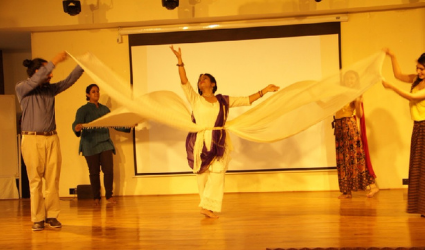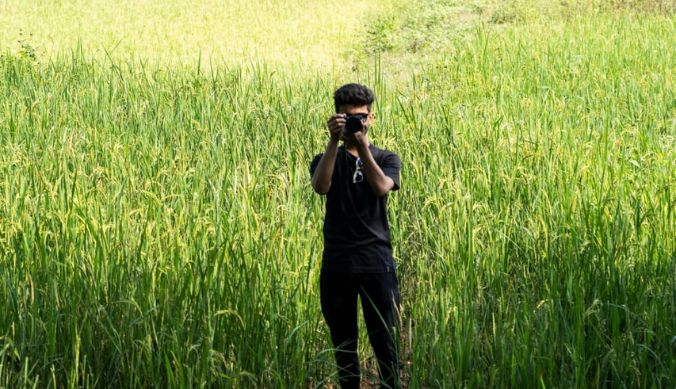Reimagining Shakespeare: The Bard of Sonepat
Fellows at Ashoka University used live performances, film and art installations to present their innovative re-imaginations of the bard's work.
October, 2015: The Shakespeare festival at Ashoka University was a phantasmagorical tour de force. Over two days, Young India Fellows showcased 38 imaginative interpretations of Othello and The Tempest. Despite the protracted schedule, the festival enjoyed a consistently high turnout, with no less than 80 people in attendance at any given time. Professors Madhavi Menon and Jonathan Gil Harris were effusive in their praise for the community vibe of the festival in particular, singling out how supportive all the Fellows were of each other’s work.
While the reimaginations ran the gamut from standard stage performances to staged readings, short films, puppet theatre and even performance art installations, five in particular stood out. Here’s a quick glance at those five.
The Independent Bahu
Team Kalaji Gully Films painstakingly created O.K, a stop-motion animation short which gender swapped the roles of Othello and Desdemona. By steeping it in an extremely familiar visual language – the melodramatic Ekta Kapoor saas-bahu sagas – the team depicted the relatable story of Ojaswini, a working woman who gets caught in the crosshairs of Machiavellian relatives. O.K. is a light hearted and sometimes almost parodic account of Othello with buoyant Bollywood tunes and an uplifting happy ending in contrast to the dour original. After completing the intricate drawings, the team took more than two thousand photos over three days to complete the filming process. Editing and voice dubbing followed. Some ideas such as an introductory sequence inspired by the famous TV Series Kyunki Saas Bhi Kabhi Bahu Thi were abandoned for their time consuming nature. Director Sreeja Basu admits that the production process was gruelling but the team soldiered on, powered by their love for Indian soaps and the amount of fun they had working with each other.
The Ballad of Drapaudi and Karna
Team Shakespeare’s Karma uncovered themes from Othello in the Sanskrit epic Mahabharata by imagining a secret love between Draupadi and Karna. Ramdhari Singh Dinkar’s classic poem Rashmirathi where Karna was the protagonist was a huge source of inspiration. However, the team chose to centre their reimagining on Draupadi who is embattled by the forces of patriarchy. This leads to interesting deviations from the original text, including Krishna as an Iago character, and the tragic climax where Karna takes the place of Duryodhana in instigating Draupadi’s public disrobing. Spoken Hindi poetry emerged as the obvious choice to present these thoughts. Sourabh Harihar penned the verses which were then fine-tuned by the entire team. The members read their lines from the audience; a pointed choice situating Drapaudi and Karna’s love in a human context as opposed to her lionised marriage with the Pandavas. The Sankritised Hindi further contributed to the old-world feel of the reimagining.
Socks and Puppets
Retelling Othello through sock puppets is a daunting task but Sockspeare’s Society pulled it off with a dose of sugar, spice and everything nice. With beautifully designed miniature sets and handmade sock puppets, the show was set in a school where petty jealousy tears apart the life of a rich and popular girl. The team constructed the set in a day using a water filter container they found in the basement of the administration building. Other junk material, including unused sketchbook paper and waste cardboard, added additional features to the set design. The team practiced the puppet movements in front of a mirror to gauge how the audience would view it. It was a feat of coordination as the members on stage had to match their actions with those reading the dialogues offstage. In the grand tradition of theatre, they pulled it off with aplomb.
Harry, Hitler and the Horcrux
One of the most interesting recontextualisations of Othello was a performance art exhibit assembled by Arpit Jain and co. By setting the tale of Harry Potter in the era of the Third Reich, the team explored how Nazi propaganda was instrumental in defining who constituted outsiders. The entire exhibit was in a tutorial room. Under the malignant power of the Horcrux (Mein Kampf in this instance), the famous trio from the Harry Potter series are in a state of delirium. Harry furiously scribbles away in a diary. Hermione performs a wand dance with ‘do not touch me’ and ‘mudblood’ written on her hand. A helpless Ron begs people for money while selling off all his belongings. A range of paraphernalia completed the atmosphere. Papers with Nazi propaganda were strewn around, a vibrant painting depicted Harry, Ron and Hermione destroying the Horcrux and a clip of Hitler from the movie Downfall was dubbed to give the impression he was on the hunt for the trio. The exhibit also had a reference to India’s politics. A prophecy also warns about a Voldemort who will rise in the East. No points for guessing who it is!
Forbidden Love
A surprising number of adaptations had sapphic love at their centre. Team Sneha and co. went for those most relatable of archetypes. An America-returned daughter presents her partner to her conservative Brahmin family, except in this case that partner is a girl. This leads to a rollicking comedy which explores how desire is policed in traditional Indian families. The play also brings out the malleable nature of Shakespeare’s words as the father uses the language to justify his right-wing Hindu agenda and conservative beliefs while the daughter uses it to break free. The audience laughed at all the right places but there was also a sense that real life was playing out on stage.












